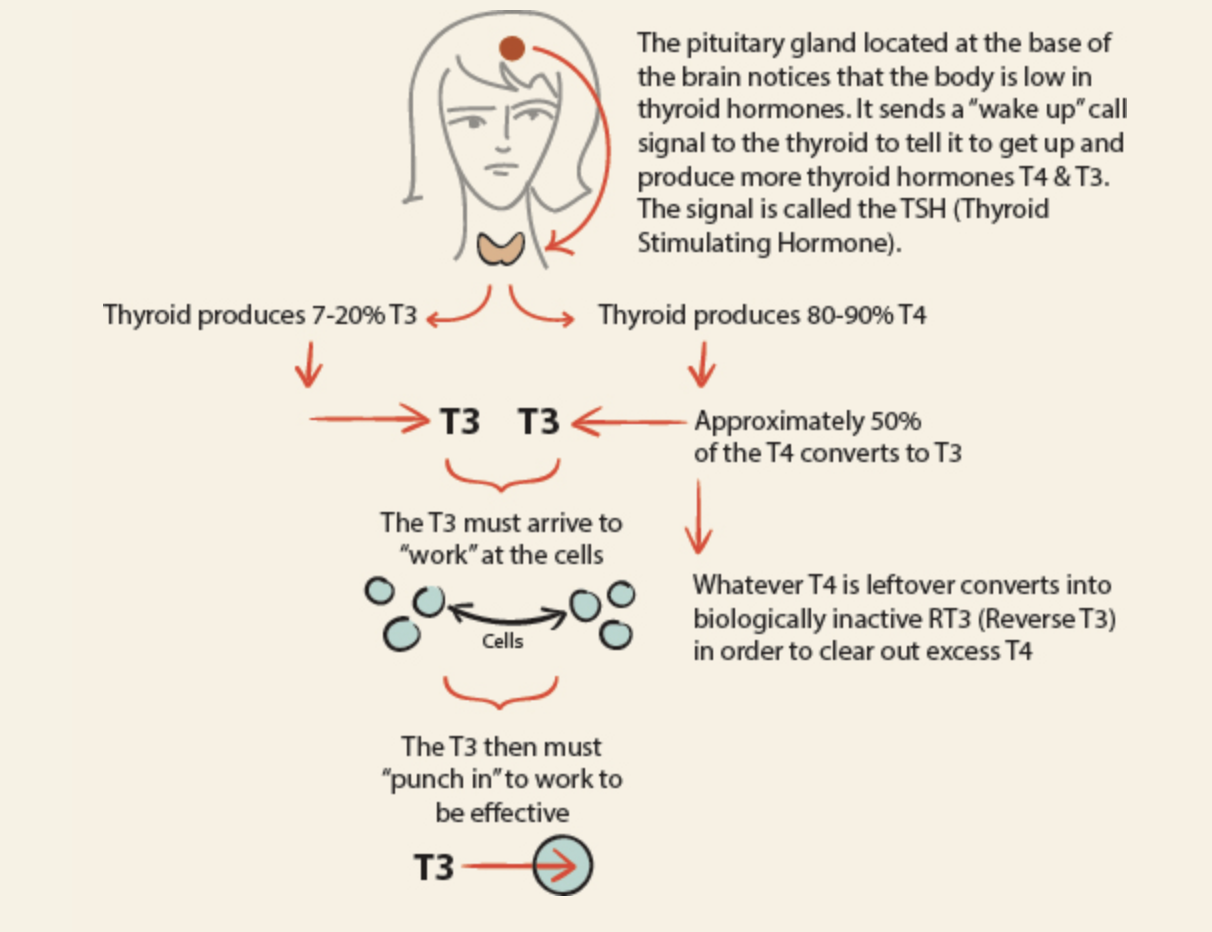Understanding Reverse T3 Thyroid Issues: Causes, Symptoms, and Solutions
Apr 03, 2023
Reverse T3 is a tricky business for a variety of reasons, of which the scariest being that many doctors don’t know what it is, and therefore they don’t know how to test for it or fix it. T4 is a storage hormone that converts into the metabolically active thyroid hormone T3. Reverse T3 issues happen when, due to a variety of factors, T4 converts into too much Reverse T3, which is the inactive form of T3 (thus making the person hypothyroid). This can happen with natural T4 released from your thyroid gland or it can happen to someone taking T4-containing thyroid hormone replacement. Hypothyroid symptoms show up even though Free T3 blood levels may look optimal or even high.
Imagine Reverse T3 like this: RT3 will guard and block the T3 cell receptor, preventing the T3 from getting into that cell to do its job and take you out of a hypothyroid state. Reverse T3 is your body’s way of protecting you by lowering your metabolic rate in times of crisis, stress, inflammation, or disease. Because T3 is a powerful energy producer in the body, the body prefers to lower metabolic rate while it deals with other health issues. “For example, in the case of chronic dieting, if one is over-restricting calories, the body thinks it is in a state of starvation and so the body will convert T4 into RT3 in an attempt to lower metabolic rate (fat-burning) because the body wants to hold onto the fat you currently have until you are out of “starvation” mode and can fuel the body with enough nutrition to turn off the RT3 alarm.

T4 to T3 conversion problems can be caused by a number of factors, including chronic stress, depression, starvation/extreme dieting, insulin resistance, diabetes, chronic fatigue syndrome, fibromyalgia, chronic inflammation, iron deficiency, exposure to toxins and heavy metals, low and/or high cortisol problems (adrenal dysfunction or fatigue).
Reverse T3 issues feel exactly like when you are hypothyroid—awful! During my Reverse T3 issue, I experienced the same symptoms as when I was seriously hypothyroid before getting optimized on NDT many years prior: exhaustion, depression, weight gain at a rapid rate (especially around the waist), brain fog, myxedema, a sense of being overwhelmed by small tasks, inability to think clearly, and extremely dry, cracked skin on my index finger. Luckily, I caught my RT3 problem much faster than my initial hypothyroid diagnosis years prior. Thyroid hormones play a crucial role in regulating metabolism, growth, and development in the human body. However, imbalances in thyroid hormone levels can lead to a variety of health problems. One lesser-known issue is an imbalance in reverse triiodothyronine (rT3), a hormone that can impact thyroid function. In this blog post, we will explore the role of reverse T3, its connection to thyroid issues, and potential solutions to restore balance.
It is important to note - the only thing that converts into Reverse T3 is T4.
The Role of Reverse T3
Reverse T3 (rT3) is an inactive form of the thyroid hormone triiodothyronine (T3). It is produced when the body converts the prohormone thyroxine (T4) into rT3, instead of the active T3 hormone. Under normal circumstances, this conversion process is well-regulated, and rT3 has a negligible impact on overall thyroid function. However, in certain situations, rT3 levels can increase, leading to thyroid imbalances and associated symptoms. (Source)
Causes of Elevated Reverse T3
Several factors can contribute to elevated rT3 levels, including:
- Chronic stress: Stress hormones such as cortisol can interfere with the conversion of T4 to T3, leading to increased rT3 production.
- Illness: During periods of acute or chronic illness, the body may increase rT3 production as a protective mechanism to conserve energy.
- Nutrient deficiencies & Toxicity: Deficiencies in essential nutrients, such as selenium, iron, and zinc, can impair the conversion of T4 to T3, resulting in elevated rT3 levels. Heavy metal toxicity or exposure to black mold can also wreak havoc on conversion and mitochondrial function.
- Medications: Certain medications, like beta-blockers, can interfere with thyroid hormone conversion and lead to an increase in rT3 levels. (Source)
Symptoms of Reverse T3 Imbalance
Elevated rT3 levels can cause symptoms similar to hypothyroidism, as the excess rT3 can block the active T3 hormone from binding to its receptors. There are 30-40 hypothyroid symptoms out there but these are the main culprits.
- Fatigue
- Weight gain
- Cold intolerance
- Dry skin
- Hair loss
- Constipation
- Depression
- Brain fog
Diagnosing Reverse T3 Issues
A reverse T3 test can help determine if rT3 levels are contributing to thyroid dysfunction. This test measures the levels of rT3 in the blood and is often performed alongside other thyroid tests, such as TSH, free T4, and free T3. If rT3 levels are found to be elevated, further investigation into the underlying cause is necessary to guide treatment.
Addressing Reverse T3 Thyroid Issues
Treatment for rT3 imbalance typically involves addressing the underlying causes of the elevated levels and potentially thyroid hormone replacement.
- Stress management: Incorporating stress-reducing activities such as yoga, meditation, or counseling can help lower cortisol levels and improve thyroid hormone conversion. Adrenal support could be an option to discuss with your doctor. (Source)
- Nutritional support: Ensuring a diet rich in essential nutrients, such as selenium, iodine, iron, and zinc, can support healthy thyroid function and hormone conversion. (Source)
- Medication review: Consulting with a healthcare professional to review current medications and potentially adjust dosages or explore alternative treatments may help improve rT3 levels. (Source)
- Hormone therapy: In some cases, thyroid hormone replacement therapy, such as T3-only supplementation (liothyronine sodium), may be necessary to restore hormonal balance. This is one of the most misunderstood choices for thyroid hormone replacement and so finding an expert who understands this on a deep level is what you will need to succeed if T3-only is the only available option for you. For me, T3-only treatment saved my life and was the only answer for me in escaping a Reverse T3 issue. The reason T3-only works is because T3 cannot convert into rT3...only T4 can convert into rT3...so if you eliminate the problematic T4 then you eliminate the trouble. T3-only is the last resort choice for thyroid hormone replacement, but can be a life-saver for patients like me with unresolved rT3 issues. If you have a doctor who claims that T3-only treatment is dangerous, unfounded, or not medically sound - you can refer them to Pfizer, a pharmaceutical company that produces liothyronine sodium (brand name Cytomel), which states that liothyronine sodium can be used in cases of impaired T4 to T3 conversion. Here is a quote from the document: "Indications: Cytomel (liothyronine sodium) is indicated in the treatment of patients with hypothyroidism who have impaired conversion of T4 to T3. The product can be used alone or as an adjunct to other thyroid replacement therapies." (Source)
Reverse T3 imbalances can contribute to thyroid dysfunction and negatively impact overall health. By understanding the role of rT3, identifying potential causes, and seeking appropriate treatment, individuals can work towards restoring thyroid balance and improving their overall well-being. If you suspect you may have a reverse T3 thyroid issue, talk with your doctor and arm yourself with knowledge.
About the author: Elle Russ is a #1 bestselling author, world-renowned thyroid health expert, and master coach. Take her Thyroid Masterclass HERE
Sign Up For My Newsletter!
I hate SPAM. I will never sell your information, ever.

